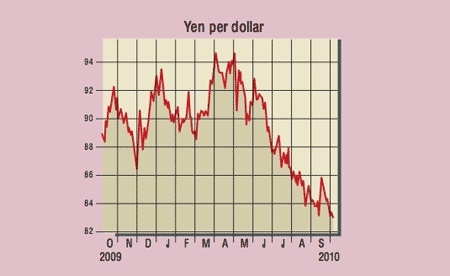Get the latest financial news, insights and expert analysis from our award-winning MoneyWeek team, to help you understand what really matters when it comes to your finances.
You are now subscribed
Your newsletter sign-up was successful
Want to add more newsletters?

Twice daily
MoneyWeek
Get the latest financial news, insights and expert analysis from our award-winning MoneyWeek team, to help you understand what really matters when it comes to your finances.

Four times a week
Look After My Bills
Sign up to our free money-saving newsletter, filled with the latest news and expert advice to help you find the best tips and deals for managing your bills. Start saving today!
The Bank of Japan (BoJ) gave markets a jolt this week by announcing a "comprehensive monetary easing package". It cut its main interest rate from 0.1% to a range between 0 and 0.1% and promised to maintain its "virtually zero-interest-rate policy" until deflation has been defeated. It also said it would consider buying public and private-sector assets, ranging from government and corporate debt to ETFs. The aim is to bring down long-term interest rates and shore up the economy. This would all amount to US and UK-style quantitative easing (QE). Global stocks bounced on the news, while the yen fell against the dollar before clawing back all its losses.
What the commentators said
No wonder the BoJ felt it needed to make waves, said Mure Dickie in the FT. The recovery is losing steam, with industrial production and business confidence sliding. The strong yen is undermining exports. However, as central bank activism goes, this is pretty small beer, says the FT. "Few will notice" that rates are now between 0 and 0.1%, rather than 0.1%. And "to call the asset purchase programme a drop in the bucket is to belittle the drop".
The buying programme would be worth 5trn, while the amount of government debt and corporate debt outstanding is 700trn and 54trn respectively. Meanwhile, the US is set to embark on another big round of QE, which is likely to weaken the dollar. So the BoJ's move will do little for the yen, said The Economist.
MoneyWeek
Subscribe to MoneyWeek today and get your first six magazine issues absolutely FREE

Sign up to Money Morning
Don't miss the latest investment and personal finances news, market analysis, plus money-saving tips with our free twice-daily newsletter
Don't miss the latest investment and personal finances news, market analysis, plus money-saving tips with our free twice-daily newsletter

The reason markets were impressed is that the BoJ has been repeatedly criticised for being far too passive in the face of deflation and stagnation. Set against the way it had "resigned itself to the sidelines", this latest move "appears almost radical", said the FT.
It's the symbolism that counts, agreed Ian Campbell on Breakingviews. Japan is "trying harder" to conquer deflation and stagnation "and doing it with monetary policy, not still more fiscal spending".
QE, and especially its apparently imminent resumption in the US, is the dominant theme in the markets. Just about everything except the dollar is on the rise in the hope of yet more liquidity providing a "strong support for risk assets", as Divyang Shah of IFR Markets put it. QE could well do this (see page 9), although the danger is that the gains evaporate quickly. The first round of QE didn't work, as we noted last week, and the chances of the second working aren't great. Once the markets twigged that the Fed is "pushing on a string", said John Mauldin on Investorsinsight.com, "it would not be pretty".
Get the latest financial news, insights and expert analysis from our award-winning MoneyWeek team, to help you understand what really matters when it comes to your finances.
MoneyWeek is written by a team of experienced and award-winning journalists, plus expert columnists. As well as daily digital news and features, MoneyWeek also publishes a weekly magazine, covering investing and personal finance. From share tips, pensions, gold to practical investment tips - we provide a round-up to help you make money and keep it.
-
 Should you buy an active ETF?
Should you buy an active ETF?ETFs are often mischaracterised as passive products, but they can be a convenient way to add active management to your portfolio
-
 Power up your pension before 5 April – easy ways to save before the tax year end
Power up your pension before 5 April – easy ways to save before the tax year endWith the end of the tax year looming, pension savers currently have a window to review and maximise what’s going into their retirement funds – we look at how

